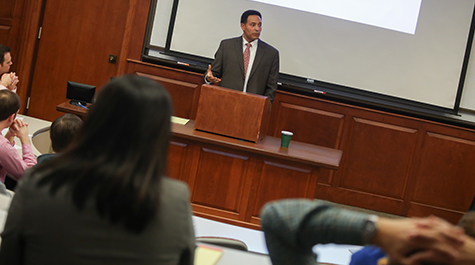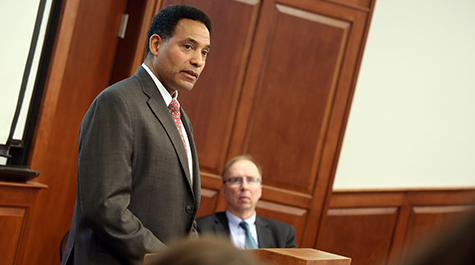BU’s Hylton Delivers W&M Law’s Annual George Wythe Lecture
Keith N. Hylton, the William Fairfield Warren Distinguished Professor at Boston University School of Law, presented William & Mary Law School’s Annual George Wythe Lecture on Monday, February 6.
Introducing Hylton to members of the William & Mary community, Dean Davison M. Douglas praised his “extraordinary range” across many areas of the law.
“Professor Hylton has published and done research in torts, labor law, intellectual property, antitrust, and civil procedure—and today’s paper is on criminal law,” Douglas said.
Hylton’s lecture, “Whom Should We Punish, and How? Rational Incentives and Criminal Justice Reform,” provided a comprehensive account of what he called “rational punishment theory.”
“I want to apply what I call the ‘standard framework’ – running through people like [Cesare] Beccaria, [Jeremy] Bentham and Gary Becker, along with public choice theory, to talk about the scope of criminal law and what sort of punishments we should use,” Hylton said.
Hylton was particularly interested in what criminal law will cover beyond traditional crime.
“Criminal law has traditionally covered common law crimes—those things that we know intuitively are bad things to do,” he said. “But there are other things that criminal law is starting to cover—price fixing, for example, sale of illegal drugs, things like that.”
Hylton went on to address appropriate punishments, as well as the use of fines to fund the criminal justice system. He also fielded questions from students and faculty.
Hylton joined the Boston University Law faculty in 1995 after teaching for six years and receiving tenure at Northwestern University School of Law. He has published five books and more than 100 articles in numerous law and economics journals, and serves as a contributing editor of the Antitrust Law Journal, co-editor of Competition Policy International, and editor of the Social Science Research Network’s Torts and Products Liability Law Abstracts.
The George Wythe Lecture Series began at the Law School in 1976. Wythe (1726-1806) was a distinguished lawyer, statesman, and judge, and was a mentor to Thomas Jefferson. In 1779, at Jefferson's urging, he was appointed as William & Mary’s—and the nation’s—first professor of law.
Hylton’s paper will be published in an upcoming issue of the William & Mary Law Review.
About William & Mary Law School
Thomas Jefferson founded William & Mary Law School in 1779 to train leaders for the new nation. Now in its third century, America's oldest law school continues its historic mission of educating citizen lawyers who are prepared both to lead and to serve.

